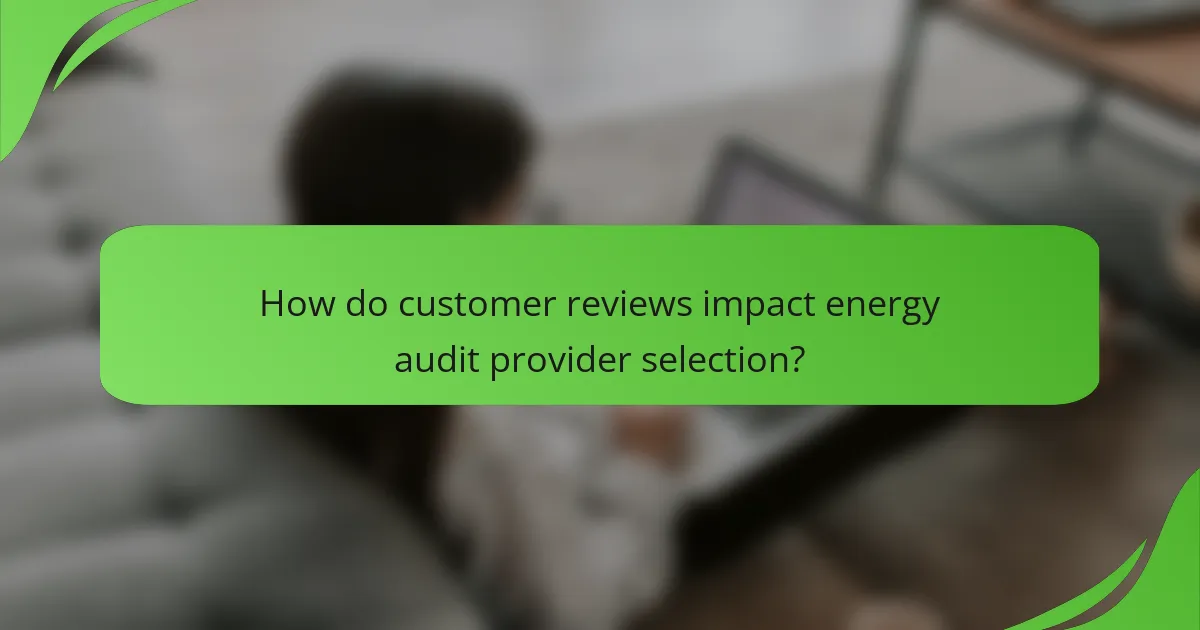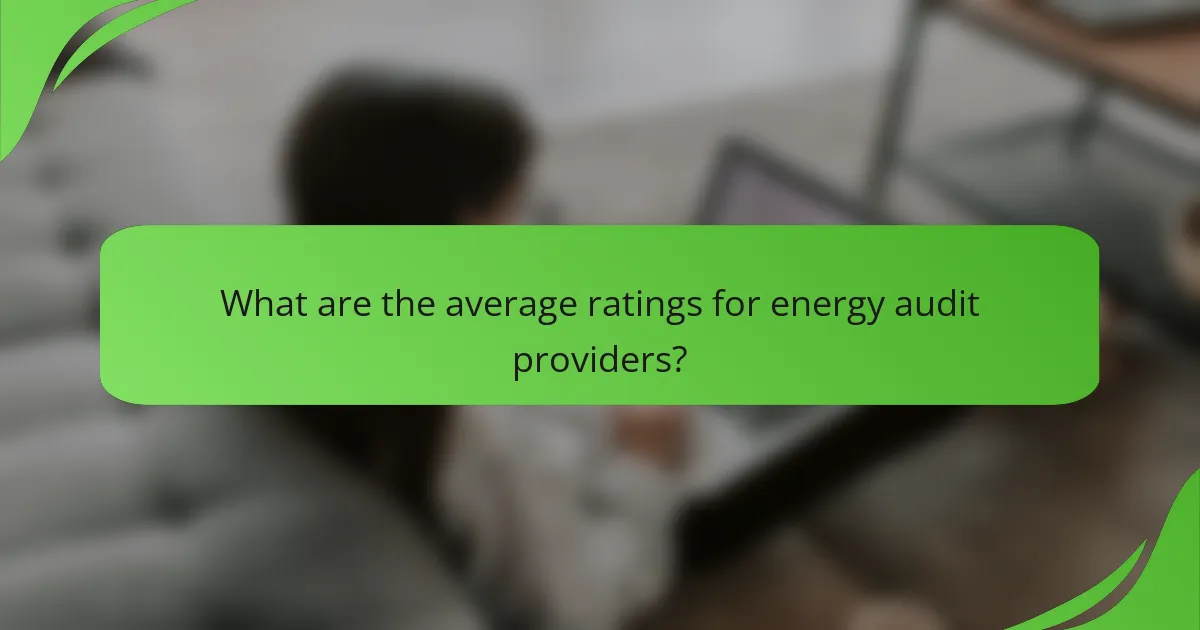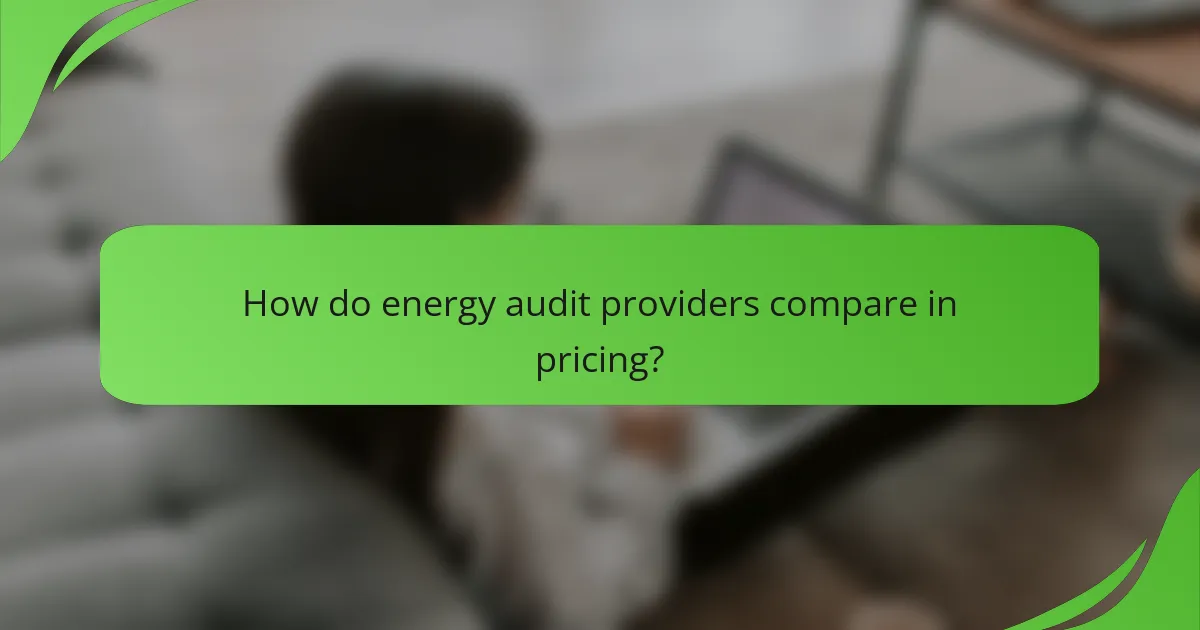Energy audit providers play a crucial role in helping businesses and homeowners optimize their energy usage and reduce costs. By conducting thorough assessments, these experts identify inefficiencies and offer tailored recommendations for improvement. Customer reviews and ratings are essential in guiding potential clients toward reliable providers, as they reflect the quality of service and effectiveness of the audits performed.

What are the best energy audit providers in the United States?
The best energy audit providers in the United States typically offer comprehensive assessments of energy consumption, identify inefficiencies, and recommend improvements. Key players in this field are known for their customer service, expertise, and ability to deliver actionable insights that can lead to significant energy savings.
Provider A
Provider A is recognized for its thorough energy audits and personalized service. They utilize advanced technology to assess energy usage and provide detailed reports that highlight areas for improvement. Customers often praise their knowledgeable staff and the clarity of their recommendations.
When considering Provider A, look for their certification in energy auditing and any affiliations with local energy efficiency programs. They often offer incentives or rebates that can offset the cost of the audit, making it a financially viable option for homeowners and businesses alike.
Provider B
Provider B stands out for its focus on commercial energy audits, catering specifically to businesses looking to reduce operational costs. Their team conducts on-site evaluations and provides tailored solutions that align with industry best practices. Many clients report significant savings after implementing their suggestions.
It’s beneficial to inquire about Provider B’s experience in your specific industry, as they may have specialized knowledge that can enhance the audit’s effectiveness. Additionally, they often provide follow-up services to ensure that recommended changes are successfully implemented.
Provider C
Provider C is well-regarded for its commitment to sustainability and energy efficiency. They offer a range of services, including residential and commercial audits, and emphasize the use of renewable energy sources. Customers appreciate their holistic approach, which not only identifies energy waste but also promotes eco-friendly solutions.
When choosing Provider C, consider their track record in achieving energy savings for similar properties. They may also offer financing options for implementing energy-efficient upgrades, making it easier for clients to invest in long-term savings.

How do customer reviews impact energy audit provider selection?
Customer reviews significantly influence the selection of energy audit providers by shaping perceptions of reliability and service quality. Positive feedback can enhance a provider’s reputation, while negative comments may deter potential clients from choosing them.
Positive reviews increase trust
Positive reviews serve as endorsements that can build trust in energy audit providers. When potential customers see high ratings and favorable comments, they are more likely to feel confident in the provider’s ability to deliver quality services. For example, a provider with a consistent track record of five-star reviews may attract more clients compared to one with mixed feedback.
Moreover, positive reviews can highlight specific strengths, such as thoroughness in audits or excellent customer service. This information can help customers make informed decisions based on what matters most to them, whether it’s cost-effectiveness or the provider’s expertise in energy efficiency.
Negative reviews highlight weaknesses
Negative reviews can reveal weaknesses in energy audit providers, such as poor communication or inadequate follow-up. When potential clients encounter such feedback, they may reconsider their options, seeking providers with a better reputation. For instance, a provider with multiple complaints about missed appointments may lose business to competitors who demonstrate reliability.
Additionally, negative reviews can serve as a warning sign, prompting customers to ask specific questions before hiring a provider. They might inquire about the provider’s response to past issues or request references from satisfied clients to ensure they are making a sound choice.

What are the average ratings for energy audit providers?
The average ratings for energy audit providers typically range from 3 to 5 stars, depending on customer experiences and service quality. Factors influencing these ratings include the thoroughness of the audit, customer service, and the effectiveness of recommendations provided.
Provider A average rating
Provider A has an average rating of approximately 4.5 stars based on customer reviews. Clients frequently commend their detailed assessments and the professionalism of their auditors.
Many users report satisfaction with the actionable insights provided, which often lead to significant energy savings. However, some customers have noted delays in receiving their final reports.
Provider B average rating
Provider B’s average rating hovers around 3.8 stars, reflecting a mix of positive and negative feedback. Customers appreciate the affordability of their services but have expressed concerns about the depth of the audits.
While many find the initial consultation helpful, there are mentions of less thorough follow-up recommendations. This provider may be suitable for budget-conscious consumers looking for basic audits.
Provider C average rating
Provider C boasts an average rating of about 4.2 stars, with many clients praising their comprehensive approach. Customers often highlight the thoroughness of the energy assessments and the clarity of the reports delivered.
However, some reviews indicate that scheduling appointments can be challenging due to high demand. Overall, Provider C is viewed as a reliable option for those seeking detailed energy audits and effective solutions.

What factors should I consider when choosing an energy audit provider?
When selecting an energy audit provider, consider their experience, the range of services they offer, and their pricing structure. These factors will help ensure you receive a comprehensive and valuable assessment of your energy usage and potential savings.
Experience and certifications
Look for providers with a solid track record in energy auditing and relevant certifications. Certifications from recognized organizations, such as the Association of Energy Engineers (AEE) or the Building Performance Institute (BPI), indicate a level of expertise and adherence to industry standards.
Experience matters; providers with several years in the field are likely to have encountered a variety of scenarios, allowing them to offer tailored solutions. Ask for references or case studies to gauge their past performance and client satisfaction.
Service offerings
Evaluate the range of services provided by the energy audit company. A comprehensive audit should include assessments of insulation, HVAC systems, lighting, and appliances, along with recommendations for improvements. Some providers may also offer follow-up services, such as implementation support or ongoing monitoring.
Consider whether the provider uses advanced tools, like thermographic imaging or blower door tests, to identify energy leaks and inefficiencies. The more thorough the audit, the better the insights you will gain into your energy consumption.
Pricing structure
Understand the pricing model of the energy audit provider. Some companies charge a flat fee for a standard audit, while others may have tiered pricing based on the size of the property or the complexity of the audit. It’s essential to clarify what is included in the price to avoid unexpected costs.
Request quotes from multiple providers to compare pricing and services. Keep in mind that the cheapest option may not always provide the best value; consider the quality of service and the potential savings from energy efficiency improvements when making your decision.

How do energy audit providers compare in pricing?
Energy audit providers typically charge between a few hundred to several thousand dollars, depending on the scope of the audit and the size of the property. Factors influencing pricing include the complexity of the audit, the technology used, and the provider’s expertise.
Provider A pricing range
Provider A offers energy audits starting at around $300 for basic residential assessments. For more comprehensive evaluations, including detailed reports and recommendations, prices can reach up to $1,500. Customers often appreciate the thoroughness of the service, which includes follow-up consultations.
Provider B pricing range
Provider B’s pricing starts at approximately $500 for standard residential audits, with costs rising to about $2,000 for larger properties or commercial audits. This provider is known for using advanced diagnostic tools, which can justify the higher price point for many clients seeking in-depth analysis.
Provider C pricing range
Provider C typically charges between $400 and $1,800, depending on the specific services requested. They offer a variety of packages, including energy efficiency assessments and utility bill analysis, which can help clients identify potential savings. Their competitive pricing and flexible options make them a popular choice among homeowners.

What are the benefits of conducting an energy audit?
Conducting an energy audit can lead to significant advantages, including reduced energy costs and enhanced efficiency in energy use. By identifying areas of waste and improvement, property owners can make informed decisions that benefit both their finances and the environment.
Cost savings on energy bills
One of the primary benefits of an energy audit is the potential for substantial cost savings on energy bills. By pinpointing inefficiencies, homeowners can implement changes that may lower their monthly expenses by a notable percentage, often in the range of 10-30%.
For example, sealing air leaks and upgrading insulation can drastically reduce heating and cooling costs. Many utility companies offer rebates or incentives for energy-efficient upgrades, further enhancing savings.
Improved energy efficiency
Energy audits help improve overall energy efficiency by identifying outdated appliances and systems that consume excessive energy. Replacing these with modern, energy-efficient models can lead to lower consumption and reduced environmental impact.
Additionally, audits often reveal opportunities for better energy management practices, such as optimizing heating and cooling schedules. Implementing these strategies can not only enhance comfort but also contribute to a more sustainable living environment.

What are common customer complaints about energy audit providers?
Common customer complaints about energy audit providers often revolve around poor communication, lack of thoroughness, and unexpected costs. Clients frequently express dissatisfaction with the perceived value of the service compared to the fees charged.
Poor Communication
Many customers report that energy audit providers do not communicate effectively throughout the audit process. This can include a lack of updates on scheduling, unclear explanations of findings, or insufficient follow-up after the audit is completed.
To avoid this, clients should seek providers that offer clear communication protocols and ensure they understand the timeline and deliverables before starting the audit. Asking for regular updates can help keep the process transparent.
Lack of Thoroughness
Customers often feel that energy audits are not comprehensive enough, missing critical areas of their homes or businesses. This can lead to overlooked energy-saving opportunities and dissatisfaction with the overall service.
To mitigate this issue, clients should inquire about the audit process and what specific areas will be covered. Requesting a checklist of audit components can help ensure that all relevant aspects are addressed during the evaluation.
Unexpected Costs
Unexpected costs can arise when additional services or repairs are recommended after the initial audit. Customers may feel blindsided by these charges, especially if they were not clearly outlined beforehand.
To prevent surprises, clients should ask for a detailed estimate that includes potential additional costs before the audit begins. Understanding the pricing structure and any possible follow-up services can help manage expectations and budget effectively.
